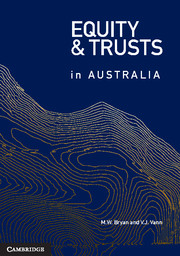Book contents
- Frontmatter
- Contents
- Preface
- Table of Cases
- Table of Statutes
- Abbreviations
- Part A Introduction
- Part B Equitable Remedies
- Part C Equity, Contract and Property
- Part D Equitable Obligations
- Part E Express Trusts
- Part F Performing the Trust
- Part G Breach of Trust
- Part H Non-Consensual Trusts
- 22 Resulting Trusts
- 23 Constructive Trusts
- Index
- References
23 - Constructive Trusts
from Part H - Non-Consensual Trusts
- Frontmatter
- Contents
- Preface
- Table of Cases
- Table of Statutes
- Abbreviations
- Part A Introduction
- Part B Equitable Remedies
- Part C Equity, Contract and Property
- Part D Equitable Obligations
- Part E Express Trusts
- Part F Performing the Trust
- Part G Breach of Trust
- Part H Non-Consensual Trusts
- 22 Resulting Trusts
- 23 Constructive Trusts
- Index
- References
Summary
Introduction
A constructive trust is imposed by operation of law when it would be inequitable, by reference to established equitable principles, for the defendant to deny the obligations of trusteeship. The award of a constructive trust usually involves the court ordering the defendant to hold property to which he has title on trust for the plaintiff. But in some situations the constructive trust is awarded as a personal remedy; the defendant is held accountable as if he were a trustee. Someone who knowingly assists a trustee or other fiduciary to commit a breach of duty will be accountable as a constructive trustee. As constructive trustee he must account to the beneficiary for loss caused by the breach. The constructive trust is an ‘as if’ trust – the defendant is treated by equity as if he were an express trustee, even though he is not.
The constructive trust compared with other trusts
Express trust
The essential difference between an express trust and a constructive trust is that an express trust is created by the act of a settlor, who manifests an intention to create a trust, whereas a constructive trust is imposed by operation of law. Intention is not irrelevant to the imposition of a constructive trust (indeed one type of constructive trust is termed a ‘common intention’ constructive trust) but the source of the obligations imposed on the trustee is the court order, not the intention or expectations of a settlor.
- Type
- Chapter
- Information
- Equity and Trusts in Australia , pp. 389 - 413Publisher: Cambridge University PressPrint publication year: 2012



